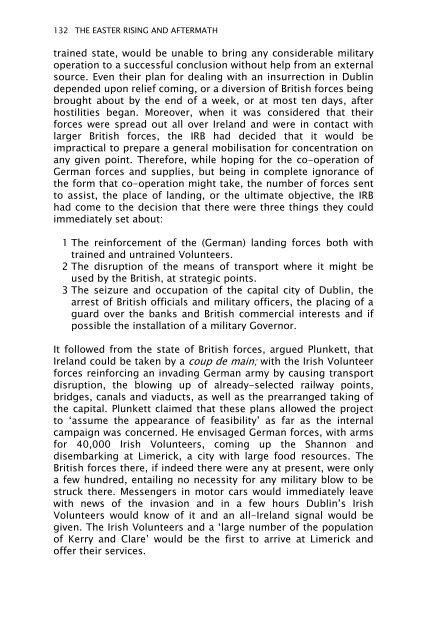Dividing Ireland: World War I and Partition
Dividing Ireland: World War I and Partition
Dividing Ireland: World War I and Partition
You also want an ePaper? Increase the reach of your titles
YUMPU automatically turns print PDFs into web optimized ePapers that Google loves.
132 THE EASTER RISING AND AFTERMATH<br />
trained state, would be unable to bring any considerable military<br />
operation to a successful conclusion without help from an external<br />
source. Even their plan for dealing with an insurrection in Dublin<br />
depended upon relief coming, or a diversion of British forces being<br />
brought about by the end of a week, or at most ten days, after<br />
hostilities began. Moreover, when it was considered that their<br />
forces were spread out all over <strong>Irel<strong>and</strong></strong> <strong>and</strong> were in contact with<br />
larger British forces, the IRB had decided that it would be<br />
impractical to prepare a general mobilisation for concentration on<br />
any given point. Therefore, while hoping for the co-operation of<br />
German forces <strong>and</strong> supplies, but being in complete ignorance of<br />
the form that co-operation might take, the number of forces sent<br />
to assist, the place of l<strong>and</strong>ing, or the ultimate objective, the IRB<br />
had come to the decision that there were three things they could<br />
immediately set about:<br />
1 The reinforcement of the (German) l<strong>and</strong>ing forces both with<br />
trained <strong>and</strong> untrained Volunteers.<br />
2 The disruption of the means of transport where it might be<br />
used by the British, at strategic points.<br />
3 The seizure <strong>and</strong> occupation of the capital city of Dublin, the<br />
arrest of British officials <strong>and</strong> military officers, the placing of a<br />
guard over the banks <strong>and</strong> British commercial interests <strong>and</strong> if<br />
possible the installation of a military Governor.<br />
It followed from the state of British forces, argued Plunkett, that<br />
<strong>Irel<strong>and</strong></strong> could be taken by a coup de main; with the Irish Volunteer<br />
forces reinforcing an invading German army by causing transport<br />
disruption, the blowing up of already-selected railway points,<br />
bridges, canals <strong>and</strong> viaducts, as well as the prearranged taking of<br />
the capital. Plunkett claimed that these plans allowed the project<br />
to ‘assume the appearance of feasibility’ as far as the internal<br />
campaign was concerned. He envisaged German forces, with arms<br />
for 40,000 Irish Volunteers, coming up the Shannon <strong>and</strong><br />
disembarking at Limerick, a city with large food resources. The<br />
British forces there, if indeed there were any at present, were only<br />
a few hundred, entailing no necessity for any military blow to be<br />
struck there. Messengers in motor cars would immediately leave<br />
with news of the invasion <strong>and</strong> in a few hours Dublin’s Irish<br />
Volunteers would know of it <strong>and</strong> an all-<strong>Irel<strong>and</strong></strong> signal would be<br />
given. The Irish Volunteers <strong>and</strong> a ‘large number of the population<br />
of Kerry <strong>and</strong> Clare’ would be the first to arrive at Limerick <strong>and</strong><br />
offer their services.








